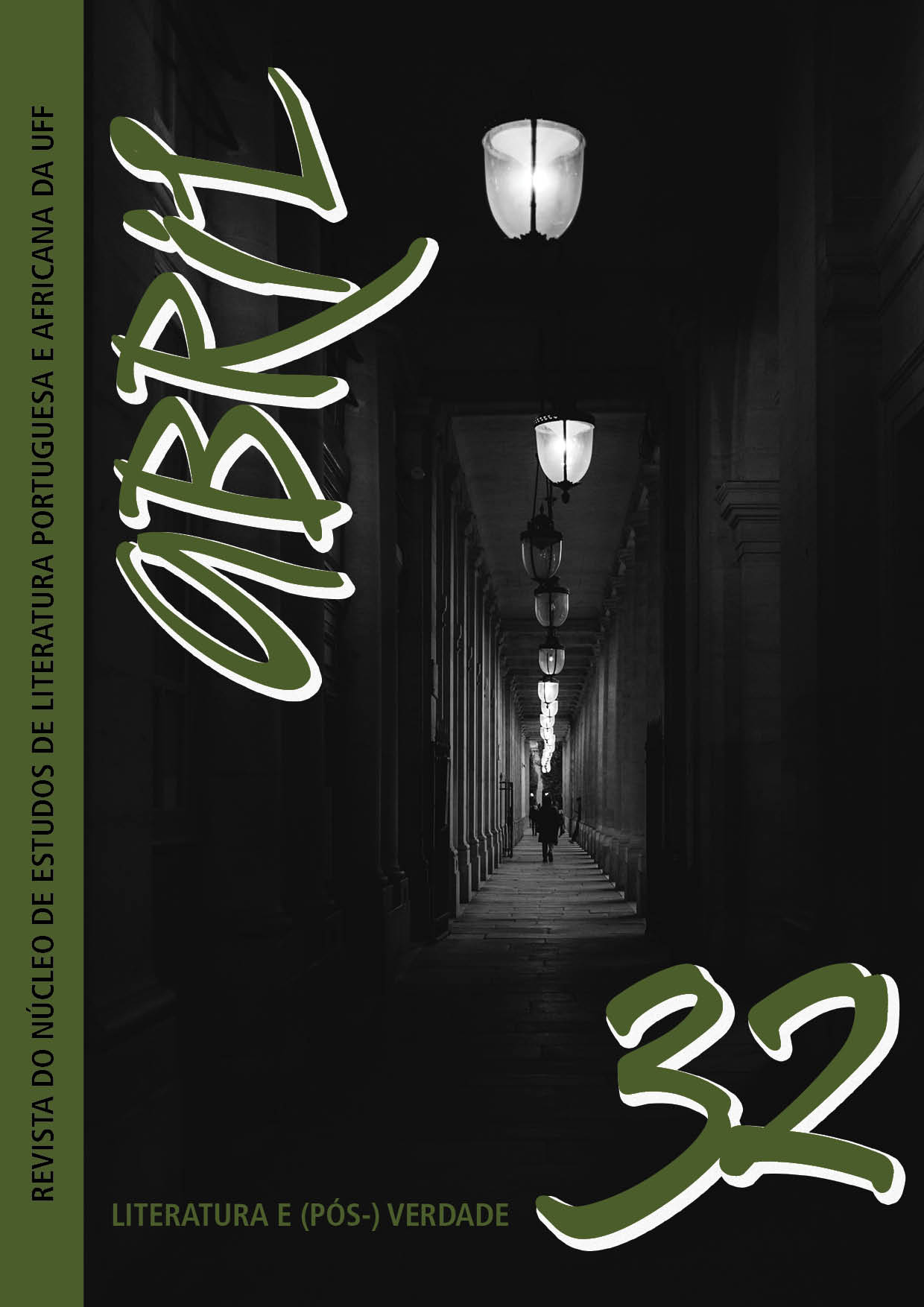En/stranhamento, infamiliaridade no pós-25 de Abril em Portugal: a poesia das décadas de 1970 e 1980 de Isabel de Sá
DOI:
https://doi.org/10.22409/abriluff.v16i32.61686Palavras-chave:
Isabel de Sá, Poesia portuguesa, Infamiliar, PsicanáliseResumo
O presente artigo tem o objetivo de discutir algumas estratégias poéticas utilizadas por Isabel de Sá no início de sua produção literária, tendo como contexto a Revolução dos Cravos, em 1974. Isabel, artista da palavra e das imagens — como professora, pintora e desenhista, começa a publicar em 1979, com Esquizo Frenia. Para avançar na investigação, lançamos mão do conceito psicanalítico que se mobiliza entre a estranheza, a infamiliaridade e o incômodo, defendido por Sigmund Freud, em 1919, que vimos recriando pela via do neologismo do en/stranho e sulca as fronteiras entre a intimidade, a domesticidade e o campo aberto do outro, do desconhecido. Desse modo, procuramos ler as obras iniciais da referida autora aproveitando a ideia de contra-imagem que Eduardo Lourenço introduz em “Psicanálise Mítica do Destino Português”, relacionando a isso o problema de que a palavra poética torna estranho quem a possui, como a própria poeta afirma em O duplo dividido, em 1989. Ao final, há também neste material uma rápida entrevista feita com a poeta Isabel de Sá.
Downloads
Referências
AMERICAN PSYCHIATRIC ASSOCIATION (A.P.A). Manual diagnóstico e estatístico de transtornos mentais: DSM-5. 5ª. ed. Porto Alegre: Artmed, 2014.
ANDRESEN, Sophia de Mello Breyner. Obra poética. Alfragide: Editorial Caminho, 2010.
BARRENO, Maria Isabel. “Prefácio fragmentado ao mundo de Isabel de Sá”. In: Festim das serpentes novas. Porto: Brasília Editora, 1982.
BESSE, Maria Graciete. “Isabel de Sá: uma poética da desordem”. In: Quadrant – Centre de Recherche em Littérature de Langue Portugaise. No. 16, Université Paul Valéry. Montpellier, 1999.
BUTLER, Judith. A vida psíquica do poder: teorias da sujeição. Belo Horizonte: Autêntica, 2017.
FREUD, Sigmund. O infamiliar. Trad. Ernani Chaves e Pedro Heliodoro Tavares. Belo Horizonte: Autêntica Editora, 2019.
LAPLANCHE, J. & PONTALIS, J. L. Vocabulário de Psicanálise. São Paulo: Martins Fontes, 1991.
LOURENÇO, Eduardo. “Literatura e Revolução”. In: O Canto do Signo: Existência e Literatura. Lisboa: Presença, 1994.
LOURENÇO, Eduardo. “Psicanálise mítica do destino português”. In: O Labirinto da Saudade. Lisboa: Gradiva, 2000.
PUCHEU, Alberto. Espantografias: entre poesia, filosofia e política. Brasília: C14/ Faperj, 2021.
RECH, Morgana. O artista e seu público: entre a psicanálise e a estética da criação. Rio de Janeiro: Subversa Edições, 2021.
SÁ, Isabel de. Semente em solo adverso: poesia reunida. Porto: Officium Lectionis, 2022.
SOUSA, João Rui de. “A dissolução da alegria [crítica a O Festim das Serpentes Novas, de Isabel de Sá]” / João Rui de Sousa. In: Revista Colóquio Letras. Livros sobre a Mesa, n.º 73, Maio 1983, p. 65.
Downloads
Publicado
Edição
Seção
Licença
Copyright (c) 2024 Abril – NEPA / UFF

Este trabalho está licenciado sob uma licença Creative Commons Attribution-NonCommercial 4.0 International License.
Autorizo a Revista Aabril - NEPA/UFF a publicar o artigo que ora submeto, de minha autoria/responsabilidade, caso seja aceito para publicação online. Declaro, ainda, que esta contribuição é original, que não está sendo submetida a outro editor para publicação, e assino a presente declaração como expressão da verdade.
Os trabalhos publicados no espaço virtual da Revista Abril serão automaticamente cedidos, ficando os seus direitos autorais reservados à Revista Abril. Sua reprodução, total ou parcial, é condicionada à citação dos autores e dos dados da publicação.

A Revista Abril utiliza uma Licença Creative Commons - Atribuição-NãoComercial 4.0 Internacional (CC BY-NC 4.0).









